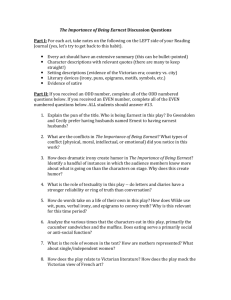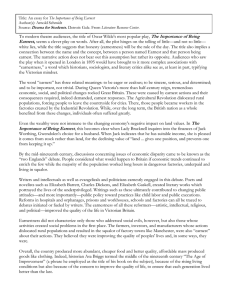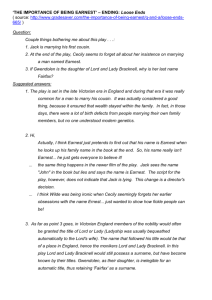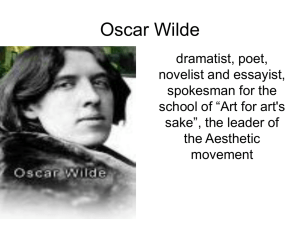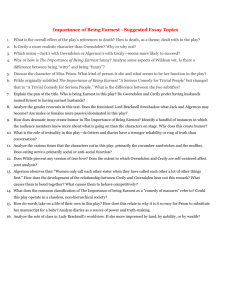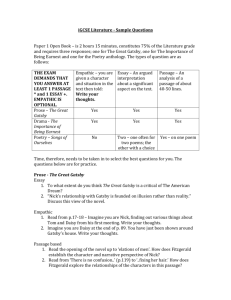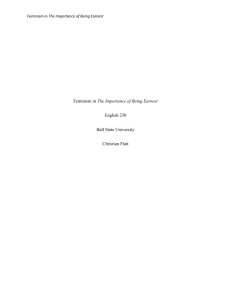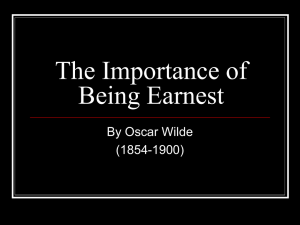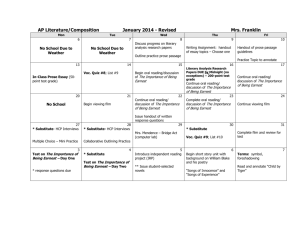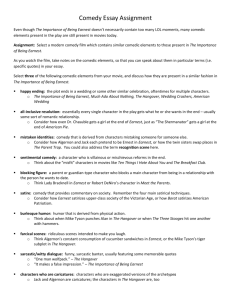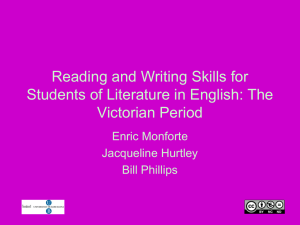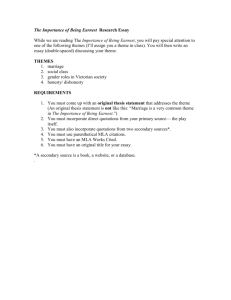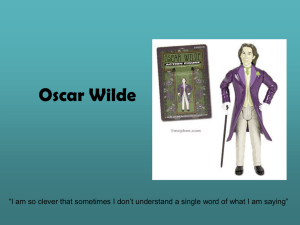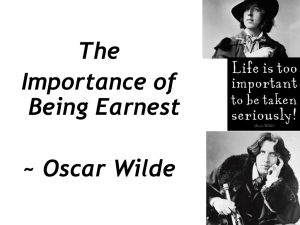essay 1The Importance of Being Earnest.doc
advertisement
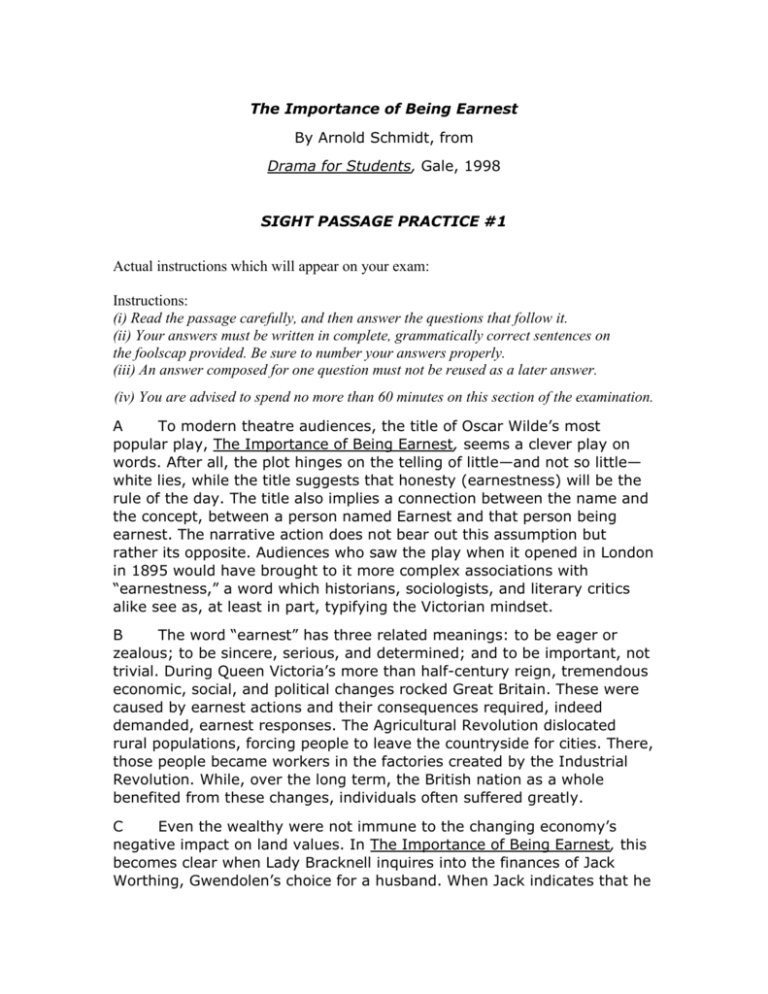
The Importance of Being Earnest By Arnold Schmidt, from Drama for Students, Gale, 1998 SIGHT PASSAGE PRACTICE #1 Actual instructions which will appear on your exam: Instructions: (i) Read the passage carefully, and then answer the questions that follow it. (ii) Your answers must be written in complete, grammatically correct sentences on the foolscap provided. Be sure to number your answers properly. (iii) An answer composed for one question must not be reused as a later answer. (iv) You are advised to spend no more than 60 minutes on this section of the examination. A To modern theatre audiences, the title of Oscar Wilde’s most popular play, The Importance of Being Earnest, seems a clever play on words. After all, the plot hinges on the telling of little—and not so little— white lies, while the title suggests that honesty (earnestness) will be the rule of the day. The title also implies a connection between the name and the concept, between a person named Earnest and that person being earnest. The narrative action does not bear out this assumption but rather its opposite. Audiences who saw the play when it opened in London in 1895 would have brought to it more complex associations with “earnestness,” a word which historians, sociologists, and literary critics alike see as, at least in part, typifying the Victorian mindset. B The word “earnest” has three related meanings: to be eager or zealous; to be sincere, serious, and determined; and to be important, not trivial. During Queen Victoria’s more than half-century reign, tremendous economic, social, and political changes rocked Great Britain. These were caused by earnest actions and their consequences required, indeed demanded, earnest responses. The Agricultural Revolution dislocated rural populations, forcing people to leave the countryside for cities. There, those people became workers in the factories created by the Industrial Revolution. While, over the long term, the British nation as a whole benefited from these changes, individuals often suffered greatly. C Even the wealthy were not immune to the changing economy’s negative impact on land values. In The Importance of Being Earnest, this becomes clear when Lady Bracknell inquires into the finances of Jack Worthing, Gwendolen’s choice for a husband. When Jack indicates that he has suitable income, she is pleased it comes from stock rather than land, for the declining value of “land ... gives one position, and prevents one from keeping it up.” D By the mid-nineteenth century, discussions concerning issues of economic disparity came to be known as the “two Englands” debate. People considered what would happen to Britain if economic trends continued to enrich the few while the majority of the population worked long hours in dangerous factories, underpaid and living in squalor. E Writers and intellectuals as well as evangelicals and politicians earnestly engaged in this debate. Poets and novelists such as Elizabeth Barrett, Charles Dickens, and Elizabeth Gaskell, created literary works which portrayed the lives of the underprivileged. Writings such as these ultimately contributed to changing public attitudes—and more importantly—public policy toward practices like child labor and public executions. Reforms in hospitals and orphanages, prisons and workhouses, schools and factories can all be traced to debates initiated or fueled by writers. The earnestness of all these reformers—artistic, intellectual, religious, and political—improved the quality of the life in Victorian Britain. F Earnestness did not characterize only those who addressed social evils, however, but also those whose activities created social problems in the first place. The farmers, investors, and manufacturers whose actions dislocated rural populations and resulted in the squalor of factory towns like Manchester, were also “earnest” about their actions. They believed they were improving the quality of peoples’ lives and, in some ways, they were. G Overall, the country produced more abundant, cheaper food and better quality, affordable mass produced goods like clothing. Indeed, historian Asa Briggs termed the middle of the nineteenth century “The Age of Improvement” (a phrase he employed as the title of his book on the subject), because of the rising living conditions but also because of the concern to improve the quality of life, to ensure that each generation lived better than the last. H Like British fanners and industrialists, British colonial administrators also justified the nation’s imperial ambitions because they “improved” the lives of “uncivilized” peoples, giving them Christianity, British cultural values, and higher living standards. This attitude came to be known as, in author Rudyard Kipling’s words, “the white man’s burden.” I Many of those enriching themselves in this way would acknowledge that their actions caused suffering as well as benefits. They justified their actions based on the utilitarianism of thinkers like John Stewart Mill. Utilitarians determine the rightness of an action by asking if certain actions produce the most good for the most people. If people in general benefited, the suffering of a few specific people could be tolerated as the price paid for progress. While this approach may seem callous and selfserving, these thinkers and tycoons were also “earnest” in their actions. J Yet the characters in Wilde’s play are not earnest in this sense. Their actions satirize popular notions of the idle rich but also poke fun at Utilitarianism as well. When Jack admits to Lady Bracknell that he smokes, she replies that “a man should have an occupation.” Later, Algernon admits that he doesn’t “mind hard work where there is no definite object of any kind.” Jack and Algernon have no real occupations or professions; their purposelessness critiques the “earnest” nature of Utilitarian activities. K Now we can see that Wilde’s use of “earnestness” is more complex than it may first appear to modern audiences. Indeed, his play offers rather biting, if understated, criticism of the institutions and values that had, by the end of the nineteenth century, made Britain the world’s greatest colonial power. Ironically, it is exactly the earnestness exhibited by Britain’s exploitative class, industrial, and colonial systems that enables the life of leisure enjoyed by the play’s main characters. When asked about his politics, Jack replies, “Well, I am afraid I really have none,” though the Liberal Unionist party with which he identifies supports the continued colonial status of Ireland. L Britain’s colonial system comes up again when Algernon jokes about sending Jack to Australia, emigration then being a common way to prevent excess population from causing unemployment and lower wages. Investment in stocks—the source of Jack’s wealth—provided economic support for Britain’s expanding economy, and by the play’s end, we learn that his father served as a general in colonial India, a common road to personal enrichment during the Victorian age. M The rich are not the only targets of Wilde’s wit, for the playwright satirizes earnestness and reformers of all kinds, in morality, education, women’s rights, and marriage. N Reformers, religious and secular alike, expended much energy on improving the morals of the working classes, particularly in regard to family life, procreation, and child-rearing. In this regard reformers often emphasized the importance of the positive example to be set by upper class behavior. The servant Lane tells Algernon he had “only been married once. That was in consequence of a misunderstanding between myself and a young person.” Algernon turns the reformers’ ideas on their heads, observing “Lane’s views on marriage seem somewhat lax. Really if the lower orders don’t set us a good example, what on earth is the use of them.” The comedy comes by satirizing the serious ideas of earnest critics of the class system (particularly communist thinkers such as Karl Marx), who wondered exactly what the purpose of the wealthy might be. Finally, Miss Prism’s conversation about christening the poor reveals an underlying anxiety about the sexuality and population growth of the working classes. O Earnest reformers engaged in the public debate about education, which expected to “improve” the middle and working classes and enhance the “culture,” as Matthew Arnold wrote, of the country in general. One forum for popular education, begun during the eighteenth century, was public lectures, and Wilde satirizes the earnest, if misdirected, efforts of educational societies whose talks have titles like “Society for the Prevention of Discontent among the Upper Orders” and a “Lecture by the University Extension Scheme on the Influence of a Permanent Income on Thought” P Wilde also satirizes the ineffectiveness of the education for the privileged in the scenes between Miss Prism and her reluctant student Cecily. More generally, though, Lady Bracknell proclaims: “The whole theory of modern education is radically unsound. Fortunately in England, at any rate, education produces no effect whatsoever. If it did, it would prove a serious danger to the upper classes and probably lead to acts of violence.” Lady Bracknell links education of the poor with social unrest, fearing that the educated masses might forget their place and reject hierarchical class structure. Q The independence and audacity of Wilde’s female characters reflects the changing status of Victorian women, part of a public debate known as “The Women Question.” It was only with the passage of a series of Married Women’s Property Acts (1870-1908) that women could hold property in their own names. The opinions of Queen Victoria herself, who opposed women’s suffrage but advocated women’s education, including college, exemplified the ambiguous situation of women in England during this period. R Cecily and Gwendolen discuss changing gender roles in their conversation about male domesticity, indicating their belief that “home seems to me to be the proper sphere for the man.” Marriage, however, remained most women’s primary goal and occupation. Arranged marriages had been on the decline since the late-eighteenth century but were not unknown among the Victorian era’s upper classes. This may have made economic sense, but it did not always create domestic harmony. Consider Algernon’s lament about the low quality of champagne in the homes of married men and his belief in the necessity of adultery, “for in marriage, three is company and two is none.” Both comments highlight the lack of companionship resulting from marriage without compatibility and love, suggesting that the Victorian husband requires alcohol and a mistress to be happy. S Wilde describes the situation for married women in equally depressing terms. When Lady Bracknell tells of her visit with the recently widowed Lady Harbury, Algernon remarks that he’s heard that “her hair has turned quite gold from grief.” The audience anticipates the Clichéd response, that her hair turned gray or white from sorrow, but Wilde turns the phrase around. T Why might her hair have turned gold instead? Like many Victorian women, Lady Harbury seems to have been trapped in a loveless marriage, the kind Lady Bracknell proposes to arrange for Gwendolen. Now that Lady Harbury’s husband is dead, she is finally free to become who and do what she wants. She feels younger, more attractive and changes her hair color. While the joke requires that we associate aging and grief, Wilde turns that around, associating widowhood instead with gold hair and joy. Algernon’s statement could also be an indication of the new wealth and independence Lady Harbury gained in inheriting her husband’s money. The simple turn of a phrase communicates a complex reality, in this case, about economic, social, and sexual politics. U The status of the nineteenth century’s educated women remained grim, however, with few occupational outlets other than teaching. Miss Prism, Cecily’s governess, combines two common female occupations, teaching and novel writing, another activity at which women flourished (and for which they were criticized). Prism’s confusion between a baby and a manuscript pokes fun at changing ideas about parenthood and child-rearing. The misplaced baby symbolizes what critics saw as a confusion of gender roles, when women entered the traditionally masculine world of the mind. The plight of orphaned baby Jack illustrates the destabilization of family ties, which in his case are sequentially lost, invented, changed, and discovered. V As Lady Bracknell says, “we live, I regret to say, in an age of surfaces,” a position echoed by her daughter’s comment that “in matters of grave importance, style, not sincerity is the vital thing.” To many, Wilde’s The Importance of Being Earnest may seem a work of “surface” and “style,” but further examination shows it to have depth and substance as well as humor. SIGHT PASSAGE QUESTIONS: (4 marks) Quality of Writing Of the twenty marks for this section, four marks are awarded for organization, clarity, and writing in Standard Canadian English. The Personal Response is weighted more heavily than the answers to the first four questions. (1 mark) 1. In your own words (approximately 20 to 30), state the author’s thesis. (4 marks) 2. Identify TWO of the following methods of development from the passage, and explain how the author uses each to advance his argument: a) example b) contrast c) cause and effect d) repetition e) allusion (2 marks) 3. Identify ONE of the following stylistic devices from the passage and explain the contribution of the device to the impact of the passage. (The student is reminded that an example used for Question #2 cannot be used again here): a) metaphor b) rhetorical question c) parallel structure d) exaggeration (2 marks) 4. a) Give TWO specific examples of the author’s use of diction in the passage and explain what makes each effective. Avoid quoting a whole sentence without identifying (underlining, or later quoting) a specific word or phrase as the effective diction. (1 mark) 4. b) Identify the tone evoked by ONE of your selected examples and explain your choice. (6 marks) 5. Personal Response: From the following excerpt from the passage, state the author’s position in the excerpt; compare it with your own position; clarify your position with examples from your own experience or observation; and indicate your own reflection or judgment. (From paragraph I ) . “If people in general benefit(ed), the suffering of a few specific people could be tolerated as the price paid for progress.” NOTE: A Personal Response that is excessively short (fewer than 100 words) can obtain at most a mark of 2 out of 4 for quality of writing.1 In your own words, state the thesis of this essay.
